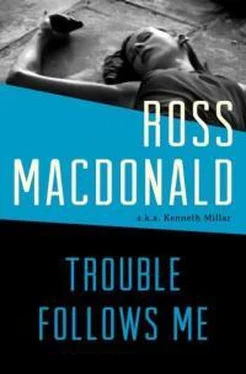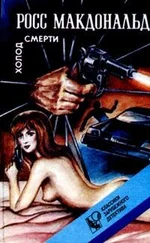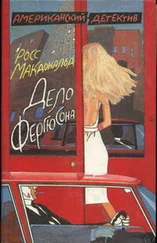I said not without complacence: “I’ve suspected it for a hell of a long time.”
“The pattern is beginning to emerge,” Gordon said. “As I see it it’s something like this. Hector Land collected information which he passed on to another agent in Honolulu. It’s unlikely that he was the only one supplying information, but he’s the only one we know about so far. The second agent–”
“Sue Sholto?”
“Perhaps. We haven’t enough evidence to say certainly yet. The second agent sifted the information, encoded the significant items, and broadcast them via the marked records to be picked up by Nip submarines lying off the Islands. The information was then re-encoded and relayed to Tokyo, or it may have been taken to Wake Island for rebroadcast.”
“But where does Anderson come in?”
“Probably on the administrative end. He coordinated the whole thing from the mainland. There doesn’t seem much doubt that he used Black Israel to recruit, or develop, potential spies. I’d guess from what Hefler told me about Land’s background, that the race riot made him ripe for subversion, and then Black Israel sucked him in. Black Israel also made its contribution to psychological warfare, by stirring up interracial strife in an arsenal city like Detroit. The web has more than one strand, and it looks to me as if Anderson sat in the center of it.”
“You think he’s the head of the organization, then?”
“I can’t say. We’ve got so pitifully little to go on so far. I admit he didn’t strike me as particularly big, or particularly dangerous. But I gave up spot judgments long ago.”
Eric returned with a guarantee that Doss would be available when he was wanted. Gordon began to ask him questions about Land’s disappearance. I told them I had a date, and went ashore. The Officer of the Deck gave me a jeep to the main gate of the Repair Base, and I took a taxi from there. It was barely nine, and I had plenty of time to get to the hotel by ten.
On the way I decided to stop at the Santa Fe station for my bag. Eric had lent me the use of his razor, but I needed a change of linen. The taxi let me out at the side entrance of the station, and I asked the driver to wait.
The baggage room was crowded with sailors retrieving their sea-bags and foot-lockers, a few drunks there for the company, a few civilians in clothes that looked a little frivolous and a little pathetic among all the lean blues. The clothes of a woman at the counter caught my eye particularly. She was wearing a tall felt hat trimmed with long iridescent feathers, gold pendant earrings, and two silver foxes which curled amorously around her neck but stared with cold button eyes.
The counter was lined three deep but I moved towards it. A sailor said without looking at me: “Hey, quit your shoving!” – then turned and added, “Sir.”
The woman with the foxes looked around and caught my eye. She gave no sign of recognition, and quickly looked away again. But not before I had recognized the rouged and raddled face of Miss Green.
I said, “Miss Green,” but she didn’t look around. I pushed slowly towards her but before I reached her she left the counter. The sailors made way for her and she was at the door before I could work my way out of the crowd.
I caught her on the sidewalk and took her arm. “Miss Green, I’d like to talk to you.”
“Let me go, I don’t know you.” I looked closely into her face in the light of a streetlamp, and saw that her eyes were empty and hot. But it was not the evil look in her eyes which went through my brain like a knife and quivered there. It was the odor of ether on her breath.
SHE tore her arm from my grasp and ran laboriously on high heels to a long black sedan which was parked ahead of my taxi. A man in the front seat who seemed to be wearing a chauffeur’s cap opened the door for her. She climbed in, the door slammed behind her, the black car jumped forward with the long rising whoop of a powerful engine, and Miss Green was out of my life again. But not forever.
I jumped into my taxi and told the driver to follow that car.
“I will if I can,” he said as he shifted gears. “That’s a Cadillac.”
When we turned the corner the black car was out of sight. We took a chance on the next corner and saw it a block ahead at Broadway, held up by a red light.
“Slow up,” I said to the driver. “I don’t want them to know they’re being followed.”
“Say, what is this? Are you in Naval Intelligence?”
“I’m working on a case with the FBI.”
“No kiddin’? Wait till I tell the boys.”
“There won’t be anything to tell them if you lose sight of that car.”
“Brother, I’ll run this crate down to an oil spot before I lose ’em.”
Before we reached the intersection the light changed. As the black car leapt away I caught a glimpse of an old evil face at the rear window. I took off my hat and held it in my hands and crouched low in my seat. There was heavy traffic in downtown San Diego that night, and maneuverability was more important than speed. My driver took his cab through impossible openings which closed a foot from the rear fenders. He aimed nonchalantly into traffic snarls which opened up like the Red Sea just before we piled up in them. We curved and skidded across the southern half of San Diego, past the all-night movies, the seedy restaurants and mushroom hamburger stands, the penny arcades, the liquor stores and warehouses, the storefront churches and four-bit flophouses, past the fish factories and the junk yards. Out of San Diego and through National City we kept the black car in sight.
On the other side of National City it accelerated. Its taillight went away from us like a small red comet and was swallowed up by the night. Simultaneously I became aware that I was on the last lap of my long ride from Detroit to Tia Juana.
The driver drove hard for a few minutes, his motor vibrating like a donkey engine. I bounced around in the back seat as the cab climbed and descended the looping coastal hills. At Palm City he slowed down and said over his shoulder:
“I tore the guts out of this baby, but she’s out of her class trying to catch a Cadillac. God damn it.”
“This is the road to Tia Juana, isn’t it?”
“Yeah, it looks like they’re going to Tia Juana.”
“Will you take me there?”
“You’re the boss. I’ll have to charge you special fare.”
“This is what I’ve been saving my money for.”
He accelerated to a steady fifty and drove for another ten minutes in silence. We topped a rise and saw the lights of Tia Juana below us. A few minutes later we stopped at the border.
“Did a black Cadillac sedan go through here a few minutes ago?” the cab-driver asked the border guard who looked at my I.D. card. Under the road lights I got my first good look at the driver’s face: fat and forty, pug-nosed, with black Irish eyes. According to the license which was pinned up in front of me, his name was Halloran.
“Yeah. The big time. Uniformed chauffeur and all.”
“You don’t know who she was?”
“Nope. She’s been through here before but I don’t know her. Why? They cut in on you?”
“No. I just thought I seen her before.”
“Some pan,” the guard said as Halloran pushed in the clutch. “She looked like she just crawled out of the woodwork and was just about ready to crawl back in.”
At the first corner in Tia Juana a barefoot boy with a flapping shirttail waved a pasteboard box and cried: “Gum! Chiclets!”
“Wait a minute,” I said to Halloran.
“You come down here to buy gum?” he said cynically. But he stopped the car. The hungry-eyed Mexican boy boarded the car like a buccaneer. “Chiclets – two for a nickel!” he cried.
Читать дальше







